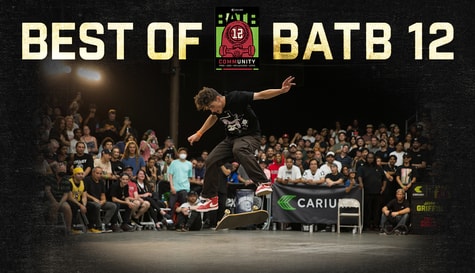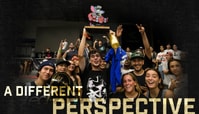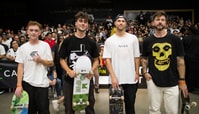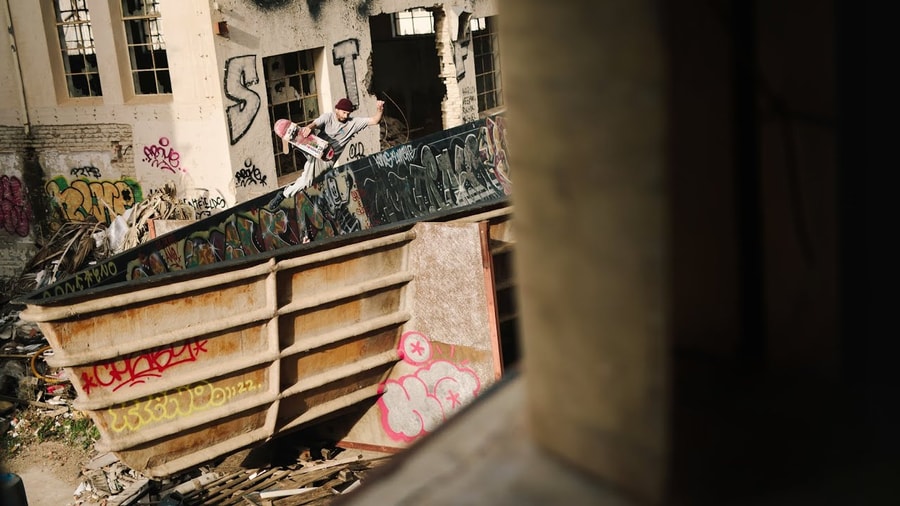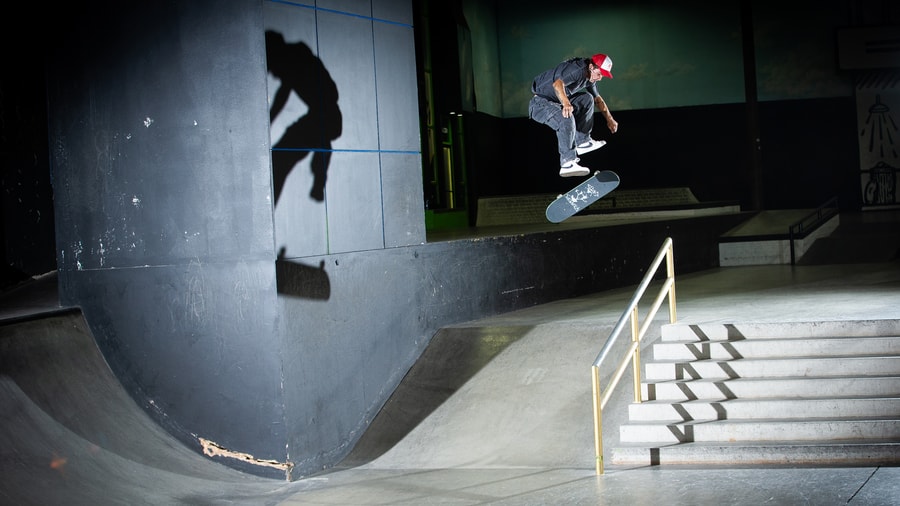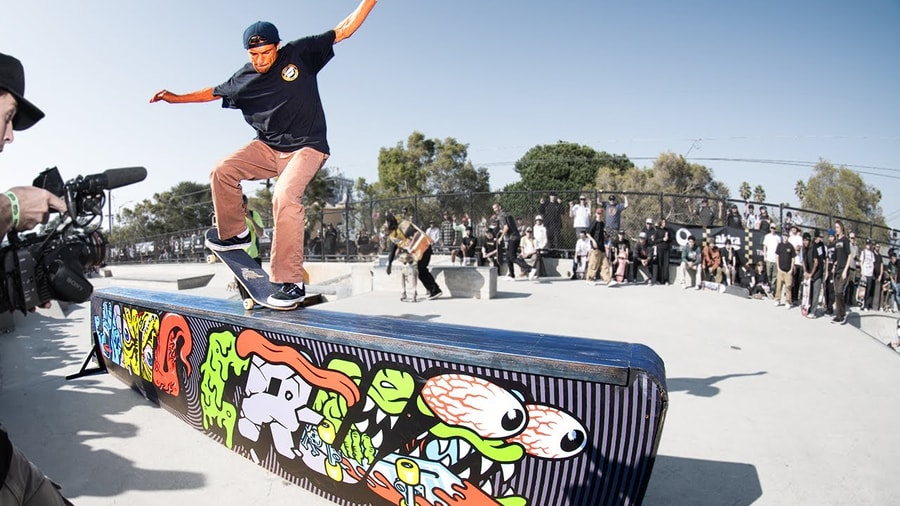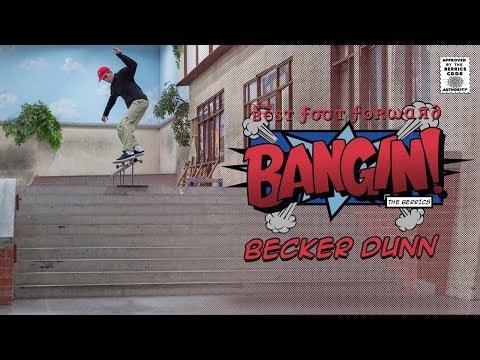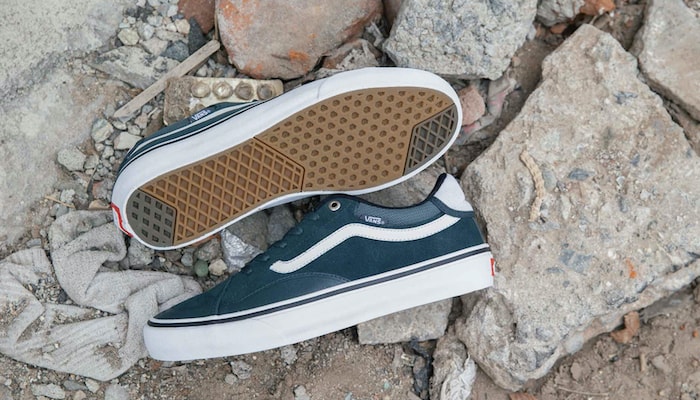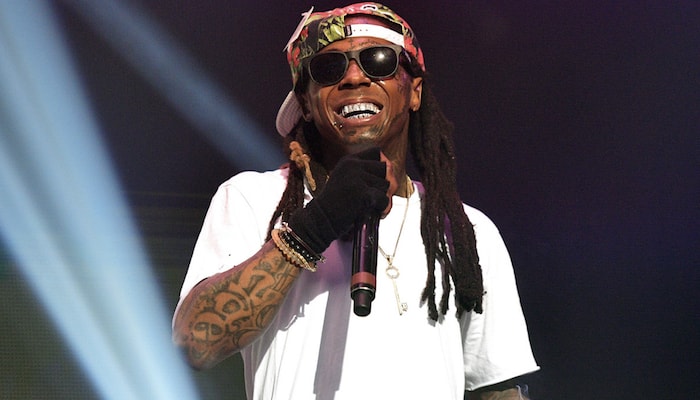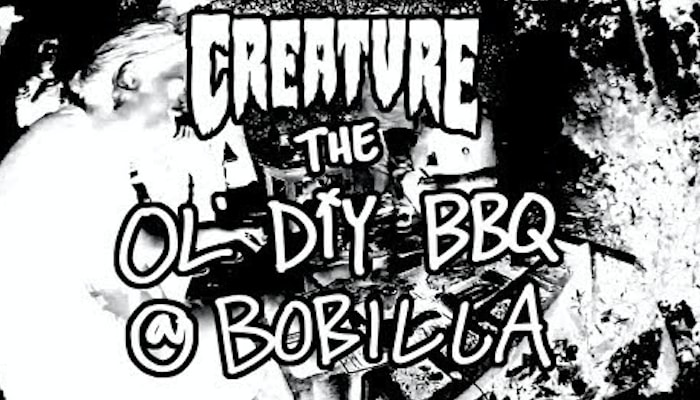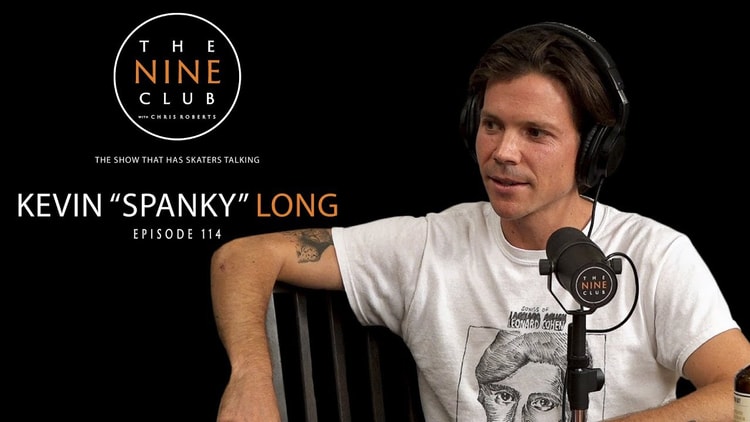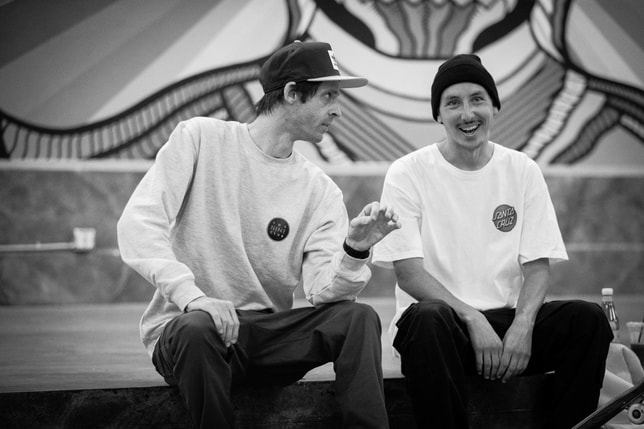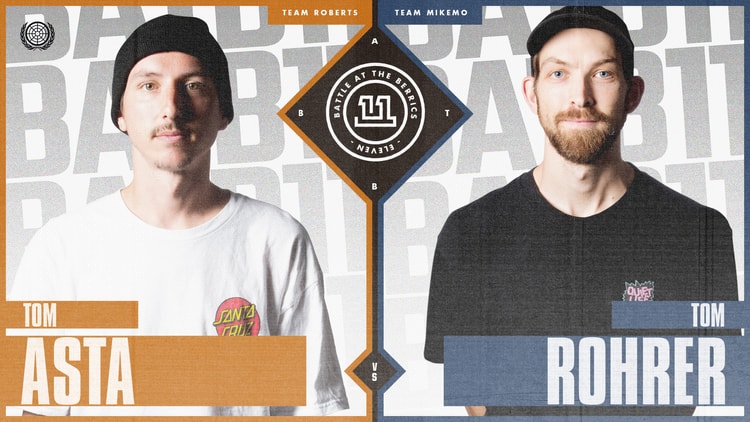‘MINDING THE GAP’ DIRECTOR BING LIU EXCLUSIVE INTERVIEW
?rel=0” height=”360” width=”640”>
WORDS: Danny Karel
It’s been a busy year for 29-year-old filmmaker/skater Bing Liu. Since premiering his documentary Minding The Gap at Sundance back in January—where it took home the Special Jury Award for Breakthrough Filmmaking—he’s been interviewed and/or reviewed by the New York Times, Rolling Stone, Roger Ebert, Time, NPR, Vox, and many other publications. He has another documentary in the works, two other projects in the pipeline, and is currently traveling, sometimes internationally, to festivals where the film is screening. Naturally, we tried to get our hands on him for an interview, and, graciously, he accepted.
On the surface, Minding The Gap is a film about skateboarders navigating early adulthood in the Rust Belt city of Rockford, Illinois. That simple premise turns into a vehicle for a range of themes, including youth, identity, masculinity, race, and the cyclical nature of abuse. It’s a testament to Bing’s chops as a documentarian that the film never feels like it’s reaching. When things get heavy, and they often do, he’ll cut to cinematic street clips which remind us—as most of you know—that skateboarding is an imperfect but reliable source of comfort. No remedy is glorified, but at the same time, hopelessness and cynicism never come around. It’s Bing’s even-handed and empathetic approach in the face of difficult personal struggle that makes the film so compelling, and it’s damn near impossible to walk away without reflecting on your own life.
When I called Bing, he was pulled over on a Chicago side street, on the way to a friend’s movie screening. Our conversation was short but his answers were thoughtful, and they gave a sense of the kind of effort and consideration required to make a documentary of this caliber. But before I could get to the meat of it, you know where I had to start.
So what was it like skating and growing up in Rockford?
I don’t know, when you’re a kid growing up skating you don’t really thinking about geography or geographical differences that much. For the first year or two at least I would just skate a mile to this neighborhood where my crew was at, and then I sort of hopped into a different crew, and this crew had someone with a car, and all of a sudden we were driving all over, including the suburbs of Chicago, which was a very different place from Rockford.
But even growing up I quickly found out that Rockford was very much a mecca for a lot of Chicagoland and even Midwest skateboarders. It’s a Rust Belt city in a way that a lot of Chicago suburbs aren’t, so there are a lot of interesting spots everywhere. Now that I’ve been to St. Louis a lot it kinda reminds me of skateboarding in St. Louis.
Did you watch a lot of skate videos growing up?
I did, yeah. My first video, when I was in 6th or 7th grade, someone give a dubbed version of Flip’s Sorry, so that was the first video I ever watched.
Dope. Were there any skate filmers or directors that you especially admired?
Yeah, on the skate video side Jason Hernandez – like everything he did for Transworld was really inspirational. And then I guess like, Harmony Korine? Essentially the movies Gummo and Kids, those movies really resonated. But Linklater was the person who made me want to make films, especially the film Waking Life, and his other films too. All his films are sort of hit or miss, but the ones that hit really speak to me.
That’s interesting. When I think of Harmony Korine and Richard Linklater they’re like opposites to me.
They sort of make films about place and community, which I like, in a way that really captures the essence of it and feels really real and accessible.
“I noticed this clear pattern of skateboarders not having healthy relationships with their fathers.”
So, from what I understand, the movie that you set out to make was a lot different from the movie you ended up making. I was wondering if you could tell me a little about how the project evolved over time?
Yeah, so it was 2012 and I had just got done with my last skate video project, which was sort of half documentary actually. I was interviewing videographers and photographers about the experience of just capturing things all the time, and what that meant on a philosophical level. I felt like I wanted to go even deeper on the next one, so I started interviewing people that I knew, skateboarders, about everything I felt that skateboarders or young people in general don’t talk about, like, you know, their parents, emotions, gender.
What slowly coalesced over a year and a half was a high concept survey film, and I noticed this clear pattern of skateboarders not having healthy relationships with their fathers or absent relationships with their fathers, and so that was what I brought to a fellowship with Kartemquin Films in Chicago in 2014. Their production organization is best known for Hoop Dreams, so they introduced me to films like that, more character driven, long-form verite. At that point, Kiere was just one of many people in that sample, and out of expediency, because this was just my passion project on the side, I kept going back to Rockford to follow Kiere, and then I found out Zach was about to become a father, and I thought that it made for a good, trackable verite film. The rest was history. It was just sort them and their lives leading the way.
The movie covers a lot of ground thematically, but I guess that’s just a virtue of the way it organically came together. I was wondering if you were ever nervous that you were trying to pull off too much while you were making it?
It’s weird, I feel like I was trying to cram so much throughout. Multiple people told me along the way and in feedback screenings “You can’t fit it all into one film, you’ll make more films” or “This scene takes away from it, you should lose this.” Ultimately, a lot got cut out, but what was figured out was that a lot of these things can be just a one-two punch, and you don’t have to, you know, say that much to say a lot in a way. Race, for example – really it’s just two or three beats in the film, but it sort of complicates the whole narrative a lot. Really it’s just a little doing a lot.

Keir Johnson, Bing Liu, and Zack Mulligan in *Minding the Gap. *Photo courtesy Chicago Reader.
I read that you were a literature major in college. I was wondering if your studies influenced the way you chose to design the film or present its characters?
It’s hard to connect the dots. My studies were much more criticism and theory, so my big takeaway coming out of school was that everything’s constructed, you have the ability to deconstruct things to see more clearly, and so that was the goal I guess – deconstruct everything. I don’t know. I mean certainly I read a lot of papers, I read a lot of books, and that critical analysis probably helped. I think it probably helped distance myself from this very personal project.
“My mom pretty much raised me by herself.”
I see that. So, you’re from the same place as Kiere, Zach and Nina, but your life kind of a different turn than theirs, and I was wondering what you attributed that to, where you found the motivation to create the film and become a creative person?
I think we all have that drive, but I think it’s the obstacles that were different. I mean, Nina has a lot of obstacles being a single mom for the most part. She didn’t have the same sort of community and communal support that Kiere, Zach and I had through skateboarding. For Zach, I won’t get too deep into it, but in his past there was a lot of traumatic things that happened from a really early age. There was a lot that went on inside of his household. For Kiere, not only did he have trauma in his childhood, but he grew up a little bit more socio-economically disadvantaged.
For me, I don’t know. If I were to self-diagnose, I would say there was a long period of time where I was sort of this latchkey kid. I spent a lot of time alone, and my mom pretty much raised me by herself, and through that I was able to build up this strong sense of self – not self-confidence, but sense of self, I guess? And so when my step father came into my life I was eight years old.
You know, what’s really damaging, I think, to children is that they learn that pain is part of love, and I felt like I had experienced enough alone time to where that lesson wasn’t imprinted onto me. I think that’s what fucks up a lot of people. Thinking that part of the definition of love is, like, “oh yeah, I get hurt too,” the idea that “they hurt me because they love me,” which is actually very wrong.
In the documentary when you’re interviewing your mom, you suggest that maybe you made the movie to “move on and not dwell on the past.” I was wondering if it was as cathartic as you had hoped?
I mean, it was certainly cathartic. There’s a lot of decisions I make in my life based off of needing catharsis, and I mean in terms of just general self-care. But I think my biggest takeaway was having all these experiences, and my experience, and everyone in the film’s experiences validated. I think that’s the number one obstacle to these issues of trauma and violence in the household, you know, that these experiences never get validated, and they never get sort of accepted. It takes a lot of hard work to be able to accept that something fucked up has happened to you, especially when there’s not a lot of ways to explore it, to talk about it, when you’re growing up. I think that’s my bigger take away.
Are you still in close contact with Kiere, Zach, and Nina after the film?
Yeah, we showed them the film before we finished it. We felt that was the ethical thing to do. And yeah, we’re sort of linked for life in a way. [laughter]
I’m not surprised! [laughter] So, the way you present skateboarding in your film is interesting to me. It’s not presented as some cure-all, which I feel like a lot of skateboard documentaries try to do. It’s presented as, like, a helpful crutch for people going through stuff, and I found that super resonant. I was wondering if you were trying to consciously avoid that cliche?
Yeah, absolutely. I’m glad you picked up on that. Yeah, I mean, it’s because like… Like I feel the best films about skateboarding aren’t about skateboarding.
Exactly.
And I feel like the reason I wanted to do the film is that I was noticing that, yeah, skateboarding wasn’t really solving a lot of problems that people I knew were facing. There’s sort of a point of diminishing returns in a way; it’s not a panacea. But it’s great, it can help you, you know, run away from your house, or have catharsis, or build a sense of self-resiliency, and all that stuff that we all know in our bones as skateboarders. But can it help you get a GED? Can it help become a good father? Not so much, right? So yeah, it was very much a conscious decision to, you know, not go down that route.
At what point in the filmmaking process did Hulu get involved?
They made an offer at Sundance and we liked that it would make the film accessible, especially to young people.
So now that you’ve made a successful documentary, do you think you’re going to keep making docs? What do you imagine for your future? Any features?
Yeah, I mean all that stuff. I sort of feel like a midwest bumpkin who’s stumbled into this Hollywood scene [laughter]. I have an agent, I have two projects in development, I’ve been working on my next doc for the past year and a half, it’s totally funded, so yeah this film really set me up. Because I was working as a camera assistant for almost a decade, so it really set me up to keep making films.
Sounds rad. Looking forward to whatever you make next man, we’ll be watching.
Thank you!
Stream Minding The Gap on Hulu. If you aren’t already a subscriber, take advantage of a one-month free trial via this link. Follow the writer Danny Karel’s Instagram for more brilliance.


